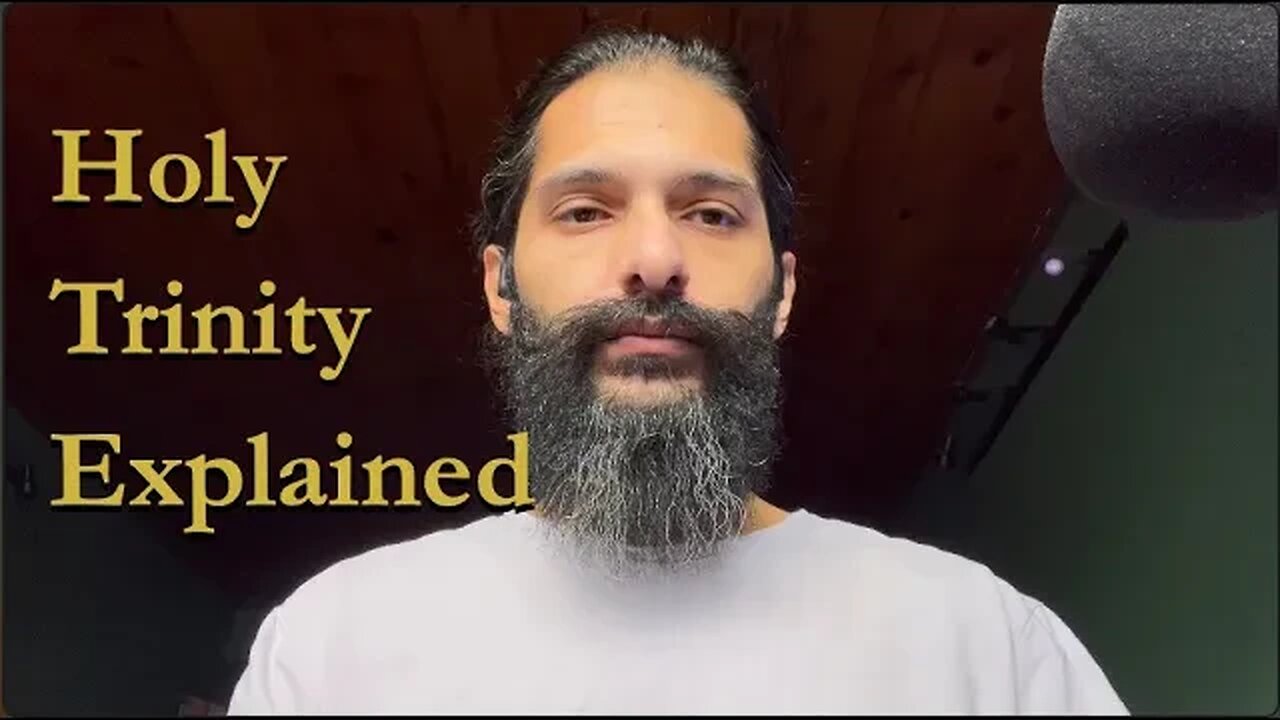Premium Only Content

Holy Trinity Explained | Patriarchs
When we say God, we are referring to the Cause of the phenomena of life that is universal and consistent in both its scope and application.
This cause is named explicitly in the Bible as “I Am.”
God can be appealed to and as appealed to directly and indirectly through his Name, I Am.
And the total power of God is expressed through his Name.
Fortunately, the Power and usage of the name of God is tied directly with the understanding of the concept and the Power can’t be misused, although it is often used unconsciously and without the explicit awareness of the user.
We are also given further abstractions and conceptualizations of God and his Name to help those of us that are progressing towards Unity and hinder those of us that trying to work towards multiplicity.
The Holy Trinity begins with Spirit, the Void, No Thing and Nothing; the Source and Space of and for All Things.
Spirit is the fundamental Awareness of Being itself.
From the Spirit comes the Father.
The Spirit is the receptive, bearing, feminine aspect of God and the Father is the creative, siring, masculine aspect of God.
From No Thing, Nothing, there is an automatic and necessary implication of All Things.
The Father is the total awareness of being All Things.
In this fundamental binary of Spirit and the Father, there is still a Unity, that begins with No Thing and ends with All Things.
But using time is not appropriate in this fundamental binary, because All Things are eternally existent and contained in No Thing, within Spirit.
There is a simultaneous and eternal existence of All Things and No Things as Spirit and as the Father.
From the Father and Spirit, we get the Son.
The Son is Some Things, a part of All Things.
The Son is the awareness of being Some Things and is the individualized creative aspect of the Father.
The Son is a necessary conceptualization of God, the Father and Spirit, in order to have experience.
Experience requires change, and a time process.
And since Spirit and the Father are total and eternal, we require the Son in order to allow constant expansion of the Father.
Spirit is fixed and all-encompassing and the Father is ever-expanding within and from Spirit using the experience of the Son in the time process.
Spirit, the Father and the Son are all equivalent as God.
The distinction between Spirit, the Father and the Son is simply for our own understanding as finite beings dwelling within time in order to further appreciate, understand and experience the infinite and the eternal.
The level of clarity and the magnitude of our expression of God and God’s Power is entirely dependent on our ability to accurately hold the concepts of God in our mortal, finite brains.
And the distance between ourselves and God is inversely proportional to our understanding.
©2022 Pearls & Bacon Ltd.
-
 LIVE
LIVE
Major League Fishing
3 days agoLIVE! - Bass Pro Tour: Stage 5 - Day 2
188 watching -
 DVR
DVR
vivafrei
3 hours agoLive with Sam Cooper! Mexican Cartels Making Drugs in Canada? Elon Musk Feud FALLOUT! & More!
69.7K9 -
 LIVE
LIVE
Pop Culture Crisis
2 hours agoJonathan Joss Investigation Update, Mar-a-Lago Face, Kylie Jenner Promotes Plastic Surgery | Ep. 851
583 watching -
 LIVE
LIVE
Untamed Nation
57 minutes agoTRUMP - ELON AFTERMATH: WHAT HAPPENED WHILE NO ONE WAS WATCHING? 6 JUNE 2025
880 watching -
 2:21:34
2:21:34
Tucker Carlson
5 hours agoLaura Delano: The Dark Truth About Antidepressants, SSRIs, and the Psychiatrists Lying for Profit
99.3K74 -
 2:50:59
2:50:59
Barry Cunningham
4 hours agoDONALD TRUMP IS PRESIDENT OF THE UNITED STATES AND ELON MUSK IS NOT! NOTHING ELSE MATTERS!
27.1K18 -
 1:05:29
1:05:29
Crypto Power Hour
9 hours ago $0.88 earnedBitcoin VS Crypto Mining
17.5K3 -
 1:05:50
1:05:50
Jeff Ahern
2 hours ago $1.14 earnedFriday Freak Out with Jeff Ahern
18.4K3 -
 DVR
DVR
SportsPicks
6 hours agoCrick's Corner: Episode 32
12.8K1 -
 1:15:35
1:15:35
The Quartering
4 hours agoMAGA CIVIL WAR!
61.2K19